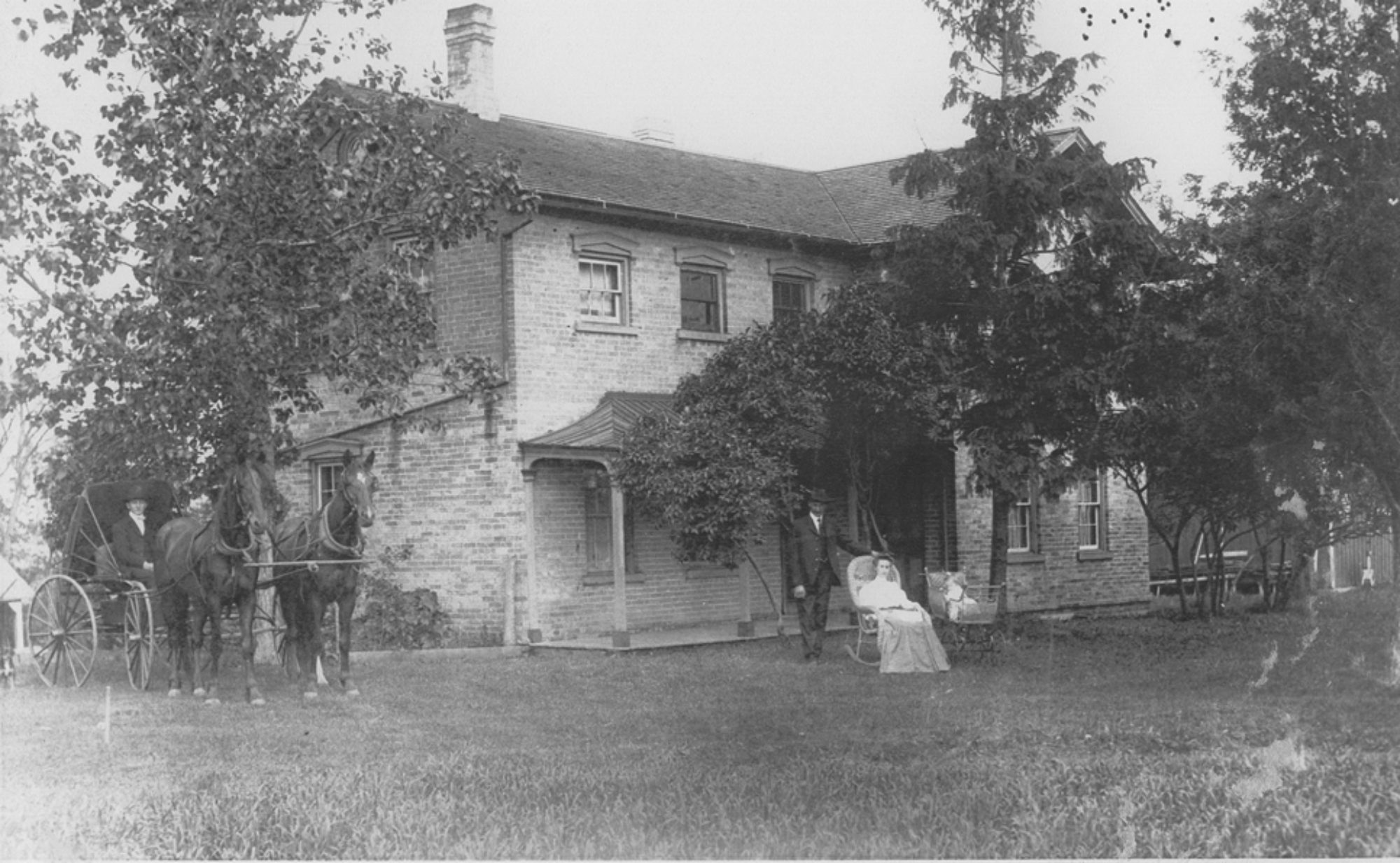The Story of Gertrud Hofmann
(As told to Edward G. Langer. Endnotes Added in 2010)
Fourth Edition, Copyright, 2021

Hover over superscripts then click to view footnotes.
I was born on May 1, 1911 in Küsnacht, Canton Zürich, Switzerland.1 That day is a national holiday in Switzerland which is their equivalent of our Labor Day. It certainly was Labor Day for my mother, Marie Walder Hofmann. (December 22, 1890-August 23, 1959). The name Küsnacht means a kiss in the night. My name was a very common name in Switzerland at the time. I had no middle name. The Swiss spelling of Gertrude is Gertrud.

I was baptized on November 19, 1911 in Sulgen, Canton Thurgau. My sponsors were my grandfather, Jean Walder, and Frida Bachofner, who may have been one of my father’s cousins. I was baptized in the Swiss Reformed Church.

My father, Friedrich Hofmann, (February 20, 1888-April 1, 1920) was from Stein, Canton Aargau. This village is on the Rhine River across from the town of Bad Säckingen, Germany. Since citizenship in Switzerland is received from one’s father, I was a citizen of Stein even though I never lived there and only visited the village a few times.2 On his marriage certificate Friedrich is listed as a “Kaufmann” which means a businessman or a merchant. He was an amateur artist. The painting of the Castle Chillon is by my father. Edward has another large painting done by my father that he was given by a cousin in Switzerland as well as a small painting.
I remember meeting my grandfather Heinrich Hofmann (June 5, 1856-February 2, 1929). He was real tall. He was a “Ferger”or a “Firger”???3 He was also an amateur artist who spent most of his Sundays painting with watercolors or doing pencil or ink sketches of plants, buildings, villages or little posters. Edward has three sketches by him that he was given by a cousin in Switzerland. His wife, Maria Anna Mueller, (March 22,1861-September 11, 1936) was shorter, like my cousin Erika Egli and me.


My mother, Marie Walder, was from the village of Oetwil am See, Canton Zürich. “Am See” means on or by the sea, since the village is a few miles from Lake Zürich. I never lived there and only visited a few times. One of the people I visited there was my cousin, Luisli Walder. I remember going there as a little girl for the funeral of my great-grandfather, Albert Walder, who died on July 18, 1915.
I did not live long in Küsnacht. We moved to Schönenberg, Canton Thurgau, after Küsnacht and lived there a few years. We lived in Kradolf, Canton Thurgau for a very short time and then moved to Horgen, Canton Zürich. Finally, we lived in Hauptwil near Bischofszell in Canton Thurgau. So I lived in five places during my ten years in Switzerland. My mother and I lived all of these years with her parents, Jean Walder (April 20, 1860-June 18, 1933) and Marie Walder-Haab (February 22, 1864-February 26, 1948), also known as Little Grandma. On the records of Oetwil am See, Jean’s name is listed as Johannes. He always went by Jean during my life. My grandfather ran some factories for people and he moved around a lot. I believe the factories were always textile factories. On my parents’ marriage record he is listed as a “Technischer Leiter in Weberei, Küsnacht.” This translates as Technical Director in the Textile Factory in Küsnacht. We used to say he was part Jewish because of the way he wandered.
When I was about nine months old, I vomited all of my food. I could not tolerate milk. Later I had serious trouble with my legs. They were so crooked, I could not walk. When I was about three years old, I was taken to a hospital in Winterthur for an operation. Both legs were operated on. I recall the hospital being very clean and white. I also remember walking with casts on both of my legs and how dirty they got. Afterwards, I had to take cod liver oil. It was awful.
I also contracted head lice when I was a young girl. They washed my head with kerosene in an attempt to solve the problem. This was not successful and so they shaved my head. This explains the pictures where I have closely cropped hair.

Growing up, I remember eating a lot of soups. We did not eat meat very often other than on Sundays and an occasional sausage during the week. We also had a lot of quiche-like dishes made of cheese or seasonal vegetables such as spinach and rhubarb. We had a lot of apples. Oranges were precious. I remember the first time I saw a banana. I was riding on a train going through the Gotthard Pass to Italy. A man on the train let me try his banana. Usually for breakfast we would eat cereal such as muesli or oatmeal. The first time I had an American style breakfast was on the boat to America when I had ham, eggs and oranges. Dinner was at noon. We were never hungry.
My parents, Marie and Friedrich Hofmann, were married on October 31, 1910 and divorced on November 6, 1912.4 At about that time my mother and I moved to another town. I do not know for sure why my parents divorced. My father was an office worker who worked for my grandfather, Jean Walder. My parents also lived with my grandfather, Jean Walder, who was a domineering individual. Jean did not think very highly of my father. He called him an empty head. My father could not tolerate the situation and left.5 He tried to take my mother with him, but my grandfather’s influence on her was too strong. My sister Betty has stated that Jean threatened to keep me if Marie left with my father. (The probable source of this story is my grandmother, who liked to tell stories, some of which were of doubtful truthfulness). I only vaguely remember meeting my father. I only have one present from my father which is a small purse. I do know that my mother always loved my father and spoke highly of him. In fact, my step-father, Leo Lötscher, was a little jealous of my father. My mother gave me pictures of my father when she realized that they bothered Leo.
My mother and I lived with my grandparents until my mother and I came to America in 1921. For a while, my uncle Hans Walder lived with us. I have fond memories of growing up in this household. I remember going swimming with Hans. He used to carry me on his back in the water. It was a lot of fun. I remember going on hikes with my mother in the hilly Swiss countryside. She taught me songs during these hikes. This was in Schönenberg. I also remember going to shooting meets with my mother and grandfather. My grandfather was a good marksman and won a number of medals. He took my mother along to dance with him. My mother was strict with me. I was taught to be obedient.
One of the Swiss customs I remember involved Saint Nicklaus’ Day. On December 6, we always received a visit from Saint Nick and his servant, Knecht Ruprecht. If we were good, we received goodies from Saint Nick. If we were bad, we were punished by Knecht Ruprecht.
My mother had many interests as a young woman in Switzerland. She was very interested in Esperanto, which is a world language. She belonged to anti-drinking clubs (this was probably a reaction to her father’s drinking). All her life my mother refrained from drinking on other than special occasions such as her birthday. We went to many different churches on Sundays. I remember her breaking her leg sledding down a hill.
My grandmother, was a real good person. I loved her a lot. She kept the house and did everything for us.
Jean Walder had an explosive personality. He had a temper and he would throw chairs. There are later reports of his having a drinking problem but I did not observe that as a child. He was married twice. His first wife was Emilie Gujer (April 28, 1865-?). They were married on February 20, 1883. They had two children: Johannes Otto, who went by Otto, (June 23, 1883-1956) and Emilie ((November 19, 1886 -???) They were divorced on May 23, 1889 in Meilen, Switzerland. My grandmother was his second wife.


My aunt, Emilie Walder lived in St. Gallen with her husband, Johann Peter Albertin. He was from Wartau, Canton San Gallen. They were married on April 25, 1908. My uncle was soft-spoken and smoked a lot of pipes. He was a very nice man. They had a beautiful house which I visited. I spent a lot of vacations there. They had a child who was terribly crippled. Emilie had a picture of her mother above her bed. Whenever Jean visited, she turned her mother’s picture around.

I do not remember my uncle Otto Walder in Switzerland. He may already have been in America6. My cousin Joanna said that Otto married his first wife, Louisa Glatz, in Milwaukee on July 28, 19107. If this is true, he was in America before I was born.

Otto, Lillian, Marie, Hans and Gertrud
I remember Hans (June 4, 1897-March 23, 1973) very well. He was always borrowing money from my mother. He used to wreck a lot of bicycles. My mother would bail him out of trouble a lot. When I was a baby, we lived a block from the school that Hans attended. I cried a lot as a baby, and they said that Hans used to come from school at lunch-time and throw a pillow case over my head to dampen the racket. He was spoiled. I remember one day when we were having sausages for dinner. Hans did not like them and so he threw them against the wall.
I remember hearing stories about my mother’s brother Ernst (October 20, 1898-July 18, 1900). He died after falling out of a window.

I had a sister Hedwig who was born in 1915.8 She was a very delicate person. She was blond and small. I did not get along with her well. She was quite feminine and I was more of a tomboy. I would play catch and go swimming in summer. I played with the boys. I did not have problems making friends. Hedwig did. She was a neat girl who did not like to get dirty. I was the opposite. Hedwig died on December 2, 1919 after eating frozen, green apples. She had terrible diarrhea. They tried feeding her everything. They even cooked oatmeal and just gave her the liquid from it. These remedies failed. Her stomach had burst. I remember going to eat at an alcohol-free restaurant after we buried her. There was no church service. She is buried in Horgen.

I remember going frantically in search of my father’s hospital when my mother learned that he was dying. He had contracted blood-poisoning. Apparently they could have amputated his leg and saved his life but Friedrich refused to live the life of a cripple. We must have visited every hospital in Zürich. My grandfather Jean had not given the message about my father’s illness to my mother right away. While we were looking for his hospital we learned that my father had died on April 1, 1920 and already was buried in Stein, Canton Aargau. My father had remarried, and had two small children, Rita (January 13, 1919-present) and Max (September 29, 1917-present)9. His second wife, Emma Mueller, was pregnant with his third child, Friedrich, who was born on October 19, 1920 after my father’s death. 10 It was very nice of Emma to send a message to her dying husband’s ex-wife so that he could see her and his daughter prior to his death.
On June 18, 1921, my Aunt Louisa Glatz Walder died in Wisconsin. She had given birth to Lillian Walder (later Fehrman) on March 23, 1921.11 Lillian was a very tiny baby who fit in a cigar box. My grandfather told my mother that she had to go to America to take care of her orphaned niece. When my mother asked me if I wanted to move to America, I said, “If I can go to school there.” I always liked school.
Before coming to America my mother took me to say good-bye to my father’s relatives. We went to Stein where I met the three Egli sisters: Erika, Mary and Klara. My first cousin, Hans Ent, remembered meeting me although I do not remember meeting him. For him, I was someone special; his cousin going to America. For me, he was just another cousin. I was just anxious to go. Sometime after my father’s death and prior to going to America, my mother took me to Seebach, near Zürich, to see my father’s children from his second marriage. I remember meeting Rita, Max, and Fritz, who was just a tiny baby. This was the only contact I had with these three until the mid-1970s when my son Edward showed me his correspondence with them.
In August, 1921, my mother and I set sail for America. We traveled on the S.S. Nieuw Amsterdam, a ship of the Holland-America line. We traveled by train to Rotterdam, the Netherlands, where we boarded the ship.12 I would not see Switzerland again until 1969, after my step-father, Leo Lötscher, died and left me a small sum of money.
My Youth in America
When we arrived in America we went to Lowell, Wisconsin to live with my uncle Otto. We lived with Otto for about a year until November 4, 1922, when my mother married Leo Lötscher, (May 6, 1885-March 12, 1968), a cheesemaker in Reeseville, who was originally from Flühli, Canton Luzern, Switzerland.13 My mother and Leo were married in Reeseville, Wisconsin. We then moved to Leipsig, outside of Beaver Dam, where Leo was running a cheese factory.
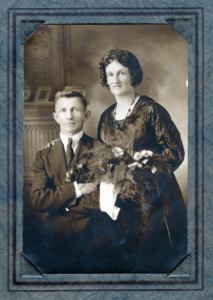
Leo was a very kind man who always took very good care of me. He treated me like his daughter. I believe he would have adopted me if he had known more about the American legal system. (I was secretly glad he didn’t adopt me since I didn’t like the name Lötscher)
Leo and Marie had three children: Louise Margaret Marie (June 15, 1923-present), Robert Leo (June 19, 1925-present) and Elizabeth Jean (March 11, 1932-present).14 Robert was named after Senator Robert LaFollette, whom Leo greatly admired. My relationship with these children was more like mother-child than sister-half-sibling, given the age difference. This is especially true of Betty. In fact, I taught Louise and Bob in grade school in Clyman.

During the summer of 1922, I lived in Milwaukee with the sister of Otto Walder’s first wife, whose married name was Bock. They ran a rooming house. I do not know why I was sent to live there that summer. I remember going to McKinley Beach to go swimming.
I was surprised to see that Lillian did not do everything that she was told as a child.
I had trouble adjusting to school in America. Math was easy because it was universal, but the other subjects were hard. It took me a year to learn English. I was assigned to first grade for a month, attended second grade for a couple months and then entered third grade.
I found America to be different from Switzerland in a number of ways, such as there being a lot more meat and fruit to eat. I also thought American children were spoiled and didn’t have to obey their parents.
Since there was no Swiss Reformed Church in Beaver Dam, I joined the First Lutheran Church in Beaver Dam. I was confirmed there as a Lutheran and later converted to Roman Catholicism during college.

I started violin lessons in Lowell, Wisconsin when I was eleven years old. At that time, I was receiving a small pension from the Swiss government as a result of my father’s death. My mother decided that this money should go for my musical training in the violin. The minister was my first teacher. I picked up piano on my own. I only took ten piano lessons in my life. I liked the piano more but we did not have the space for a piano. We did have a pump organ. I took lessons at Wayland Academy in Beaver Dam. We had a string quartet.
Shortly after we came to America, my uncle Hans Walder followed.15 He lived at the Bock rooming house in Milwaukee, Wisconsin. He married Rose Filippi (January 15, 1893-April 11, 1974), a native of Rapperswil, Canton San Gallen, Switzerland, on September 2, 1922 in Milwaukee, Wisconsin.16 They were married at the Bock rooming house. They had four children: Margaret Rose (April 12, 1924-present); Ernst Rudolph (August 2, 1925-present)17; Mabel (June 3, 1929-1935) and Virginia Gertrud (October 13, 1930-present). In Spring 1927, Hans and family returned to Switzerland. They decided they liked America better and returned to Wisconsin. When they returned, they stayed with the Lötschers.
My uncle Otto married Ida Büss on August 16, 1923. Ida knew my mother in Switzerland. My mother wrote to her and, in effect, arranged the marriage.18 They had two children, Benjamin Roland (May 27, 1927-present) and Johanna Juanita, who goes by Joanna (April 13, 1933-present). Another male child died. Ida loved children and doted on them. Ida died in 1956 and is buried in Milwaukee.19
I lived with Hans and his family in a cheese factory on Highway 33, east of Beaver Dam, the summer Ernie was born (1925).20 I helped Rose in the house. I remember that Rose Walder was a real good cook. Later in life I learned that Hans made the best cocktails, gin with raspberry juice from real raspberries.
In 1929, I graduated from Beaver Dam High School.21 I went to Oshkosh Normal School that fall for a one- year teacher’s certificate.22 I shared a room in a private home, including the bed, for a few months. My roommate gave me scabies and so I then got a private room.
| Course | Credits | Grade |
|---|---|---|
| Semester 1 | ||
| English Composition | 3 | C |
| Survey of U.S. History | 3 | B |
| Introduction to Com. Life and Gov’t | 2 | B- |
| Elementary Music | 1 | A |
| School Hygiene | 3 | B- |
| Elementary Home Economics | 1 | B |
| Techniques of Instructing the El Sch Subjects | 3 | B- |
| Library | Passed | |
| Physical Education | A- | |
| Semester 2 | ||
| Elementary Agriculture and Rural Economics | 2 | B |
| Elementary Drawing and Handicrafts | 1 | C |
| Survey of World Geography | 2 | B |
| Elementary Math | 3 | B |
| School Organization and Classroom Management | 2 | B- |
| Techniques of Instructing the El Sch Subjects | 3 | B |
| Student Teaching | 3 | B- |
I cleaned the house to help pay my rent. I also tutored a little girl. I waited on tables for a dollar. One night I was asked to mop the floor. I quit since I did not mind making salads but was not going to mop the floor.
Miss Taylor, a teacher at Oshkosh, asked me if I was a foreigner because my English sentences were a little mixed up. Afterwards, she helped me with my compositions. During my practice teaching, I pronounced some words phonetically.
While I was at Oshkosh, I continued my musical studies. I was the second chair, first violin, behind a professional musician, in the Fox Valley Symphony. I had the opportunity to play concerts in a number of towns, including Oshkosh and Ripon. I dreamed of being able to work a few years and save enough money to study music at Oberlin College in Ohio. I also was in the glee club and the college orchestra. The orchestra practiced every Sunday afternoon at the Episcopal Church where the director was a member.
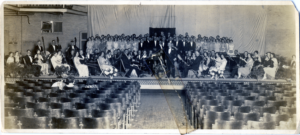
While I was at Oshkosh, I decided to convert to Roman Catholicism. My primary reason for making the conversion was my disappointment in the Lutheran Church’s constant railing against the Catholics. My step-father was Roman Catholic and he had a positive influence on my decision. In addition, my mother had converted to Roman Catholicism shortly before I did. The priest in Reeseville told me that my mother could not see me converting to Catholicism first and so she decided to convert.
In 1932, Marie and Leo moved to Clyman Center cheese factory which was located near the intersection of Highway 16 and 60 in Clyman, Wisconsin. They ran this cheese factory until around 1938, when they moved to Pennsylvania.23

Jobs were scarce and pay was low for teachers. This was the Depression. My first job was teaching in a one-room school in Fremont, Wisconsin in the fall of 1930.24 I got the job because a school board member was Swiss and knew Leo Lötscher. I taught there two years. I rented a room from Eleanor Klemp for my quarters.
In the fall of 1932, I got a job teaching at Clyman Center. (Clyman Center was located at the intersection of Highways 16, 26 and 60).25
The school year was 176 days. She had 19 students with none in 1st or 8th grade. She failed one person who was absent too much. Another got a conditional promotion. Louise and Robert Loetscher were both her students. Louise’s grades ranged from 87 to 97 and Robert’s ranged from 89 to 95. Gertrud reported that “A Christmas program was held Dec 19 at Bunalls (spelling?) Hall Clyman. School dialogues and play ‘A Poor Married Man.’ A blanket was raffled. About 100 people were present.” She signed her name “Gertrud” in these records. This school was across the road from the cheese factory that Leo Lötscher operated, and so I moved in with my parents. I bought a piano at this time. I taught there and lived with my parents until September, 1934, when I married Francis Langer.
Daily Program at the Clyman Center school for the year September 5, 1933 through May 29, 1934
| Time | Grade | Subject |
|---|---|---|
| 8:55 | All | Music |
| 9:10 | 7 | Arithmetic |
| 9:25 | 2 | Reading |
| 9:45 | 3-4 | Reading |
| 10:05 | 5-6 | Reading |
| 10:15 | 4 | Arithmetic |
| 10:35 | All | Recess |
| 10:45 | 2 | Language |
| 10:55 | 7 | Language |
| 11:10 | 3 | Arithmetic |
| 11:30 | 5-6 | Arithmetic |
| 11:45 | 7 | History |
| 12:00 | All | Noon |
| 1:00 | 2 | Reading |
| 1:20 | 7 | Reading |
| 1:35 | 3-4 | Language |
| 1:45 | All | Writing |
| 2:00 | 5 | Geography |
| 2:15 | 6-7 | Geography |
| 2:30 | All | Recess |
| 2:45 | 2 | Reading - 3 days, spelling 2 days |
| 3:00 | 5-6 | Language |
| 3:20 | 3-4 | Social Studies |
| 3:35 | 5-6 | Spelling |
| 3:45 | 7 | Agriculture 2/3 of year: spelling 1/3 of year |
| 4:00 | All | End of school day |
During 1933, I, with a young man, made cheese for Hans and Rose while they traveled to the World’s Fair.
Courtship and Marriage
I met Francis Langer in 1932 at a dance in Richwood. I had gone to this dance as someone else’s date. I talked to Francis there. He was good looking and very outgoing. He asked me where I lived and I told him Leipsig. He said that was too far to go but he asked me for a date after I moved to Clyman Center. We sang together in the church choir at St. John the Baptist Catholic Church in Clyman.
He asked me to marry him in late 1933. I agreed. I received a diamond ring on my birthday in 1934. We had a party at Clyman Center on my birthday. I did the cooking because my mother was in Switzerland. Her father, Jean Walder, had died on June 18, 1933 and Marie was probably helping to finalize his personal and financial affairs.26 Francis wrote a letter to my mother while she was gone informing her of his desire to marry me and to secure her blessings. The letter, written in English, was one of the few ever written by Francis.
At the time just prior to our marriage, Francis was running the farm due to his father’s death on August 16, 1933. Living with Francis on the farm were his mother, Amelia Pitterle Langer (December 9, 1879-June 19, 1958), his sister, Jeanette, now Sister Mary Grace Langer (March 3, 1917-present), and Henry Langer (February 6, 1919-present)27. I was desirous of being the head of my own household and made it clear to Francis that was my desire. I do not know if Amelia wanted to stay but I made my wishes clear. At that time a lot of parents stayed on the farm after their children married (e.g., the Haases). As a result of my desire and perhaps in accord with Amelia’s own intentions, Francis’ mother and siblings moved to Watertown a few weeks after our wedding. (Sister Grace reports that her mother told her that they should move because she wanted to stay on good terms with her daughter-in-law. Amelia moved in with her ailing mother.)
Our wedding occurred on September 11, 1934 at Saint John the Baptist Catholic Church in Clyman, Wisconsin. Father Klapoetke officiated. The attendants were Leo and Alta Langer. We had our reception at the cheese factory at Clyman Center.28

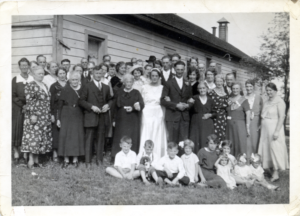
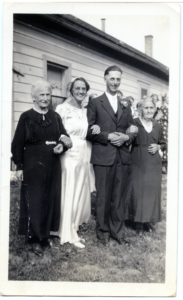
Marie Walder-Haab came to America for my wedding. She went back to Switzerland after staying in America about a year. She returned to America in March 1936. (Betty Lötscher remembers her arrival quite well because her grandmother brought her a Michelmaus for her birthday. A relative in Switzerland had made the little doll.) She kept house for Marie and cared for Betty. She never spoke English but probably understood quite a bit. (Betty remembers that she claimed to be a vegetarian but that she caught her eating salami.) She wanted to return to Switzerland but World War II intervened. After the war she wanted to return to Switzerland to die but she was never able to fulfill this wish. She is buried near North Leeds, Wisconsin, in the same cemetery where her son Hans and his family are buried.
Francis and I took a honeymoon trip to Chicago and then traveled to visit Francis’ cousins in the Ellsworth, Wisconsin area, driving along the Mississippi River on the way.
On December 5, 1934, my mother sent a letter to my father’s relatives in Stein, Switzerland, to announce my marriage. (Edward was given this letter by my cousin Erika Egli.). The letter reads as follows:
Meine Lieben alle.
Ich bin also wieder gut bei meinem Lieben angelangt und waren alle sehr erfreut mich und die liebe Grossmama zu empfangen. Leider gefällt es aber der Mama in America nicht und wird sie sehr warscheinlich wieder nach der lieben Schweiz reisen. Das Klima und die rasche Lebensweise hier gefallen ihr nicht. Es ist ihr zu viel Besuch und allerlei. Sie war sich halt an ein gar ruhiges Leben gewöhnt. Nun wir sind froh, dass sie einmal für Weihnachten hier ist und nehmen dankbar jede Stunde wo Sie bleibt.
Gertrud hat sich nun also am elften September verheiratet. Sie hat es voraus sichtlich gut gemacht. Haben eine schöne grosse Farm, wo es allerdings auch genug Arbeit gibt. Hier arbeiten die Farmerfrauen auch die meisten sehr viel. Mama sagt auch, sie glaube schon wir haben viel arbeit so wie wir essen so 3 volle Mahlzeiten im Tag. Gertrud muss jede Woche 3 mal backen Brod, Kuchen eset. Die Americaner sind es halt so gewöhnt. Ich lege Euch hier noch das Bildli bei wo ich bei Euch gemachs und ein paare von der Hochzeit. Vergesst nicht mir oder Gertrud bald zu schreiben und seid hezl. gegrüsst von uns beiden sowie von unsren Gatten und Grossmutter.
Roughly translated, the letter reads as follows:
To all of my loved ones,
Things are going well for me and I am especially pleased that my beloved Grossmama is here. Unfortunately Mama does not like America and she wants to return to Switzerland. She does not like the climate and life-style. There is too much visiting for her and she was accustomed to a quieter life. So we are happy that she will be here for Christmas and we are thankful for every hour she stays.
Gertrud was married on September 11. She has done well. (They) have a beautiful, big farm where there is much work. Here the farmwives work very hard, for the most part. Mama also says that she believes that we also have so much work because we must eat three full meals a day. Gertrud must bake bread, cakes, etc, three times a week. The Americans are accustomed to this.
I am sending you small pictures I took while I visited you and also from the wedding.
Don’t forget to write me or Gertrud soon and you are heartily greeted by us both, our husbands and Grandmother.
1934-1939
When I moved into the farmhouse, the master bedroom was downstairs where the small bedroom off the old dining room used to be. Shortly thereafter we moved upstairs.
It was expected that I would help with the milking when I moved to the farm. I tried to milk the cows but was unable to because my hands swelled up too much. My other responsibilities were for the house and the garden. Francis had the assistance of a hired man on the farm until Vern was old enough, 14, to work on the farm. The hired men generally lived with us and stayed in the small downstairs bedroom on the south end of the house. These hired men included Van Harris’ brother Glenn.

My life was soon filled with the responsibility of children since I had Jean in 1935, Vern in 1936, Carol in 1937 and Mary in 1939. I had complete responsibility for the children. At that time, it was rare for a father to assume child-rearing duties and Francis was the norm rather than the exception. He liked children when they were about two and so he would play with them in the morning when they were that age. As was common, he never changed a diaper. (Of course, given the choice, I wouldn’t have either).
Our life got a lot more stressful as a result of the children, especially due to their health problems. Both Carol and Vern had severe asthma. There were times I would hold one of them all night and slowly rock them.
We both had our hobbies that we pursued. I, of course, had my music. I brought my piano from Clyman Center. Francis went pheasant and fox hunting and bowled.
Despite these responsibilities, we were able to take a couple trips. In 1936 we took a trip to Rib Mountain, Wisconsin. Francis’ first cousin Esther Gritzbauch came to the farm and cared for Jean in our absence. Our hired man took care of the farm.
My parents moved to New Holland Pennsylvania in about 1937. Leo was in charge of a cheese factory owned by Zausner and Company. (I still have a couple small, wooden cheese boxes from this factory.) They returned to Ixonia, Wisconsin in about 1945 and for a short while ran a cheese factory there for John Faeh. Shortly thereafter they moved to Madison, Wisconsin where Leo worked for Oscar Mayer and Company.
In about 1939 we took a trip to the World’s Fair in New York City. We were accompanied by my aunt and uncle Hans and Rose Walder. Francis did all of the driving on this trip. The trip took at least a week and involved a lot of driving on narrow roads. We visited the Lötschers in New Holland, Pennsylvania on the way. We also went to Gettysburg. Esther Gritzbauch stayed on the farm with the children. Glenn Harris took care of the chores. I remember that there was no Catholic Church in New Holland. Mass was held in a large room above a store.
During the summers of 1937, 1938 and 1939, my sister Louise stayed with us and helped me with the house and kids.
1940-1949
Two children were quickly born in this period. Ralph was born in 1940 and Richard was born in 1941.
In about June 1943 I had appendicitis. During the operation the doctors determined that I was a few weeks pregnant with Robert. A blood clot developed. My mother traveled from Pennsylvania to help care for me. My condition was so serious that I was given the last rites which were only given at that time to someone on his or her death-bed. The doctor advised my mother and Francis that if I recovered, any additional births would probably kill me. I guess I showed them since I went on to have seven more children. This was very hard on Francis, who wept bitterly during the worst of the crisis.
The Second World War did not have a serious impact on our lives because Francis received a deferment due to his farming. These farm deferments were jokingly referred to as “hiding beneath the cow’s tail.” We did grow a new crop, hemp, which was used to make rope. At one time, German prisoners of war were sent to help with the harvest. Francis still remembered enough German to converse with them.
It was late in the war, about 1944, that we started to raise turkeys. We kept most of them on the range. With rationing of food during the war we had to be careful that turkeys were not stolen during the night. Francis became extensively involved with this industry. Francis signed the charter for the state’s turkey council in a lawyer’s office in Beaver Dam, Wisconsin. We went to turkey conventions almost every year. Some of these were state conventions and others were national conventions. These were held in Minneapolis, Eau Claire, Chicago and Milwaukee. One year we took Richard and Ralph to the convention. We stayed in the turkey business until about 1962.

We, of course, had more children in the 1940s. Robert was born in 1944, Elizabeth in 1945, Michael in 1947 and Rosemarie in 1948. With more children in the household, I was unable to give as much personal attention to the younger children as I was able to give to the older ones. Jean, Carol and Mary gradually assumed a great deal of responsibility in the household including helping with household chores and minding the children. During the summer of 1947, my sister Betty stayed with us and helped with the house and kids.
It was near the end of this period that Vern also began to assume responsibility for helping with the farm chores. When he became old enough we stopped having a hired hand.
Francis also assumed community responsibilities during this period. He became one of the trustees of St. John the Baptist Church in Clyman, Wisconsin. (His cousin Cyrus Langer was also one of the trustees for part of the time.)
In about 1949, a fish pond was built west of the buildings, which was planted with large mouth bass and bluegill. However, the pond was quickly overgrown with weeds, which doomed the fish, but did not interfere with its primary use as a swimming hole and ice skating rink.
I also sang in the Messiah in Watertown every year during the Christmas season.
1950-1959
It was during this period that I finally stopped having children. David was born in 1950 and he was followed the next year by Patrick. Edward was born in 1954. When I was pregnant the last time, we kept telling people that if the next child was a boy we could field a baseball team. Although we thought after three boys in a row we would have a girl , we completed our baseball team when Terry was born on April 19, 1955. I was two weeks shy of my 44th birthday.

Life was much more hectic with all these children. Each additional child strained our meager financial resources and also required Francis and me to spread our attention among more children. It was also harder to deal with children as we got older. Of course the children also assumed more responsibility as they grew older: the girls in the house and the boys with the farming. There were certain advantages to having all these children. Francis made a bargain with his elder sons that they could have a car to drive to high school if they would do the milking. This allowed him to sleep later since he was not a morning person.
A major crisis occurred in the summer of 1952. Francis wanted Vern to quit school and stay home and work on the farm. I was terribly opposed to the idea. I thought that all of the children should have the opportunity to finish high school. With the assistance of Bill Kading, I argued with Francis that Vern should be allowed to finish high school. Fortunately, the State of Wisconsin passed a statute that required all children to attend school until they were 16. This meant that Vern at least had to start his junior year in high school. After he started school, I was able to persuade Francis to allow him to finish his junior year. The next summer we had the same argument again, but eventually I prevailed and Vern, and all the rest of the boys, were allowed to finish high school. (It should be noted that Jean’s attendance at school was not an issue).
Jean and Vern had started grade school together and thus graduated together from Watertown High School in 1954. At that time the house was full with 13 children. Given the crowdedness, we found Jean a job in Madison and moved her in with my parents. Vern was planning on staying home to await the draft. While he waited, he worked on the farm and worked part-time in town. By the time he took, and failed, the army physical, he had decided that he had no interest in taking over the farm. He started college in the second semester.
We were able to take a few vacations during the 1950s. In 1956, we went with Esther Gritzbauch and her husband, Louis Weber, to Golden, Colorado to see Francis’ brother, Henry. We traveled through the Badlands, Mount Rushmore and the Black Hills of South Dakota on our way. While we were in Colorado, Henry took us to see the sights in the area, including the mountains and a mine. Unfortunately, before we left, I had fallen walking down to the chicken house that was below the granary. My right knee was seriously injured. I had to keep my leg up during most of the trip and I could hardly walk. Louise helped care for the children during this trip. This was not difficult because she lived with her family near Reeseville at the time.

In 1957, Jean, Carol, Francis and I took a trip east that went through Erie, Pennsylvania; Niagara Falls; Canada; Sault Ste. Marie and Door County. Mary watched the kids. Francis would get disturbed when boys would eye his daughters during the trip.
We got a dishwasher in about 1958. Francis decided to get one so I could spend more time with the children, especially with their music lessons.
In 1959, we had a family reunion on the farm to celebrate our 25th wedding anniversary. Almost a hundred relatives and friends attended. After the party Francis, Mary, Edward, Terry and I took the Santa Fe train to San Diego, California to visit my eldest daughter Jean who was pregnant with the eldest grandchild. Anthony Francis Michaels was born on September 20, 1959 while we were there. During this trip, we also visited Francis’ aunt Dora Pitterle, and his cousins Eleanor and Lydia Klecker in Los Angeles.
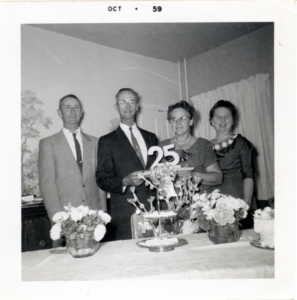
During the 1950s we also took a lot of day trips. These included trips to the Wisconsin State Fair, to Milwaukee Braves games, to Port Washington to see Francis’ sister, Sister Mary Grace, and to ride the free ferry at Merrimac, Wisconsin.
1960-1969
The 1960s, in contrast to the earlier decades, were marked with the departure, and not the arrival, of children. As children reached their late teens they moved out, generally to attend college. My relationship with my children began to change. With fewer children around, I was able to spend more time with the children who were there. Starting with the fall of 1961, I had a lot more personal time because, for the first time since October 1935, I did not have a preschooler to care for. It was much easier to go visit relatives and friends such as my step-father, Francis’ aunts Martha Langer and Mary Peirick, and my cousin Lillian Walder Fehrman. Sometimes I would have one of the younger boys stay home from school so they could accompany me on a trip to Madison to see my step-father.
Our community orientation also underwent a change in the early 1960s. In around 1961, consolidated school districts were introduced into Dodge County. Clyman Consolidated School was to become part of the Juneau school district. Since we did not want our children to go to Juneau High School, which was inferior to the Watertown High School, we petitioned to have our farm included in the Watertown School District. We were successful in this effort and as a result our children could no longer attend Clyman Consolidated School unless we wanted to pay tuition. That did not seem wise and so Francis went to the pastor of Saint Henry’s Catholic Church in Watertown to see if the youngest four children, David, Patrick, Edward and Terrence, could attend the parish’s school. This was a natural step since St. Henry’s was historically a German parish and Francis had attended second grade there in order to prepare for First Communion. Unfortunately, the school was full. Francis asked the pastor if he could inquire at the Irish parish, Saint Bernard’s. With the pastor’s blessing, Francis checked with Saint Bernard’s and found they had room for the four boys. So in the fall of 1962, the four boys began to attend St. Bernard’s grade school in Watertown.
In about 1964, I cared for Louise’s three youngest kids, John, Kathy and Dan while she and Van traveled to Texas and Mexico.
In the summer of 1965, a swimming pool southeast of the house was built. This allowed me to conveniently get my favorite exercise.However, it was plagued with cracks from its inception and was bulldozed in the late 70s.
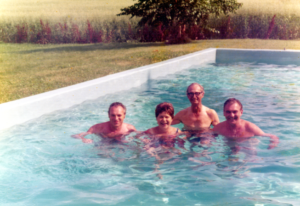
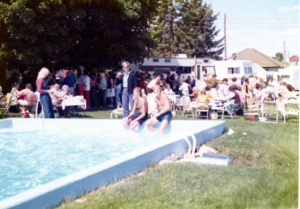
In 1966, Ralph, Jan and Marcia moved home for a short period of time while they were in the process of moving from Oshkosh to Milwaukee.
A couple years later, Francis began having a serious dispute with the pastor, Father Thomas, of St. John the Baptist Catholic Church in Clyman. He decided to leave the Clyman parish and join St. Bernard’s.
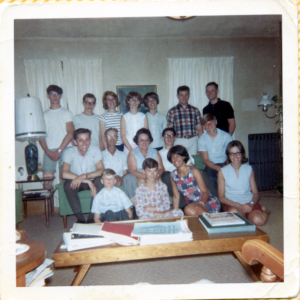
During the middle-1960s, I was asked to substitute teach a number of times at St. Bernard’s. A family friend, Genevieve Meyer Klink, was teaching fifth grade at St. Bernard’s and she was instrumental in asking me to substitute. Later I was asked to take a full-time position teaching second grade. I started this full-time position in the fall of 1967.29
In 1968, I took a Modern Math Workshop in summer school at the Wisconsin State University at Whitewater. It was a four credit course and my grade was a B. In 1969, I took a child development class. It was a three credit course and my grade was a B. I also took a three credit audio visual course.
My contract for the 1971-1972 school year was for $5,424.05.
Teaching gave me enough money to allow us to make improvements to the house, including remodeling the living room.
Second Grade Schedule at St. Bernard’s School
| 8:00 - 8:45 | M-F | Mass |
|---|---|---|
| 8:45 - 9:30 | M-F | Arithmetic |
| 9:30 - 10:00 | M-F | Phonics |
| 10:00 - 10:15 | M-F | Recess |
| 10:15 - 11:45 | M-F | Reading (3 Groups) |
| 12:45 - 1:15 | M-F | Religion |
| 1:15 - 1:35 | M-F | Penmanship |
| 1:35 - 2:00 | M-F | Science |
| 2:00 - 2:15 | M-F | Recess |
| 2:15 - 3:00 | M-Th | Language-Spelling |
| 3:00 - 3:15 | M-Th | Music |
| 2:15 - 3:15 | F | Art |
The 1960s also saw a marked widening of our circle of friends. Our eldest son, Vern, had joined a German male chorus in Milwaukee, the Milwaukee Liederkranz. In about 1968, he asked if they could have a combination picnic and campout at the farm. We agreed to that and for about ten years they had picnics and campouts at the farm. It was through this organization that we got to know the Brincks and Schmidtners.
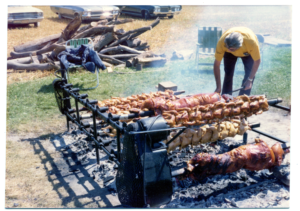
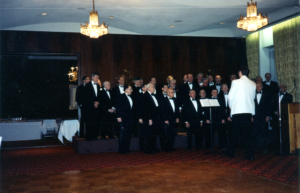
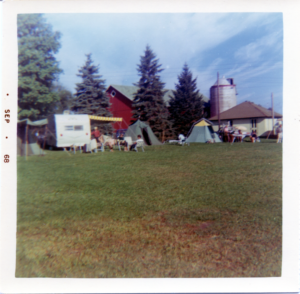
In 1968, my step-father died. I was surprised to learn that he had left his estate in equal shares to his three children and me. I decided that Leo would have wanted me to use this money to take a trip back to Switzerland. So in the summer of 1969, Francis and I traveled to Europe. We visited Italy and Switzerland. My eldest daughter, Jean, and her family were there and so we did some traveling with them. We visited the Egli sisters, my cousin Luisli Walder and my step-father’s sister, Emilie Wicki-Lötscher in Switzerland. My son Ralph watched the farm.
Shortly thereafter, Jean and family moved to Wisconsin. They lived with us temporarily and I had the honor of teaching one of my grandchildren for a short period of time at Saint Bernard’s.
The end of the decade saw a major change in the farm operation. In 1969, Patrick graduated from high school. This left Terry and Edward to help on the farm. Neither one was well suited to farming. Terry was small and Edward had suffered from a serious illness as a child which limited his physical abilities. He also had a bad attitude toward farming. Francis was sixty years old and clearly could not handle the work without a substantial contribution from someone. He was also looking toward retirement. He started to receive Social Security when he became 62 years old in 1971. Therefore the decision was made to phase out the milking operation. This was completed by 1970. The milking operation had been the major source of the farm income, and thus my paycheck assumed a greater importance in the family.
I also developed asthma in about 1966.
Also in the late 1960s Francis gave up hunting. He did this for a number of reasons. One of these was his age. Another one was the anti-war and anti-violence sentiment expressed by a number of his children.
We were frequently visited by Louis and Esther Weber, Andy and Rosie Boyum, Bob and Bern Marks30. We played a lot of sheepshead with them. I continued to make trips to see my step-father in Madison and my sister Louise near Plainfield.
During the early sixties, Joe Caughlin frequently helped with the farmwork. During most of the sixties, Louis Weber also helped on a periodic basis. During the late sixties and early seventies, Ralph helped a lot on the farm.
We also had a party at the farm in 1964 for the 25th Jubilee of Sister Mary Grace.
1970-1979
Terry graduated from high school in 1973 and went away to college. Francis and I were alone together for the first time since October 1935. Edward and Terry continued to live at home during the summers until 1979 but as adults they were not a major concern.
Francis and I took another trip to Europe in 1972 and again visited the Egli sisters, Luisli Walder and Emilie Wicki-Lötscher. We traveled with the Milwaukee Liederkranz. Gary and Rosie Zimmer watched the farm.
I retired from teaching full time in 1973, at 62 years of age. I had taught six years. I quit because Francis had retired and because there were no children to help me at home. After that I continued to substitute teach at St. Bernard’s and elsewhere. I substituted for the German teacher a number of times and also taught Special Ed. (Not to be confused with my 13th child).
My retirement did not free me from my responsibilities at St. Bernard’s. I was elected to the parish’s Council and Board of Education and served on them for a couple of years. Francis was heavily involved with Saint Bernard’s Winterfest and performed in it with members of the Milwaukee Liederkranz for several years.
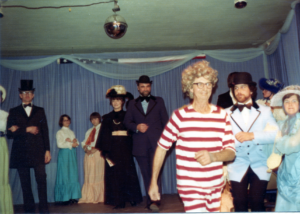
We also took trips after my retirement. Our trips included travel to Lake Superior and Saint Augustine, Florida. On the latter trip, we stopped at Disneyworld and in Tennessee. Normally during these trips, one of the children, such as Edward or Terry, would come home to watch the house and take care of the pets.
At the end of 1976, I re-established contact with my two half-brothers and my half-sister in Switzerland. This was the result of the efforts of my son Edward. Edward spent six months in school in southwestern Germany in 1973. Before he left, I gave him the addresses of the Egli sisters, Luisli Walder and Emilie Wicki-Lötscher and I encouraged him to visit them. While he was in Switzerland, he learned of my parents’ divorce. I had never discussed this with Francis or the children because of the stigma that divorce had at the time. Edward discussed his discoveries with me when he returned but never said a word to Francis. By 1976 Edward had addresses for my siblings and he had gotten enough courage to write to them in German. He was pleasantly surprised by the warm responses he received. He showed me all of the letters and so I decided to tell Francis about my siblings. I sent Christmas letters to each of them and I decided to visit them in the spring of 1977. Carol accompanied me. I really enjoyed meeting them after all of these years and we have continued to correspond up to this date.
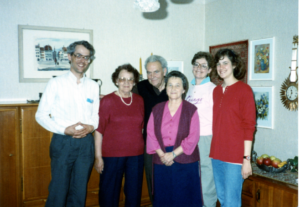
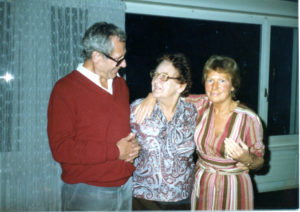
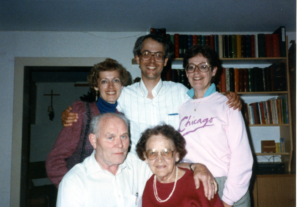
In 1979, we had a 70th birthday party for Francis on the farm.
1980-1989
I spent the 1980s in retirement. Unfortunately, it was not as pleasant as it could have been. The decade started with the loss of my hearing and ended with the loss of my husband to cancer and the sale of the farm.
In 1981, the children organized an 70th birthday party for me. All my children were there. It was the first time we were all together since the mid-1960s. It was also the last major family event in which I still had a significant amount of my hearing. My hearing deteriorated rapidly shortly thereafter.
Another major family event was the celebration of our 50th wedding anniversary in September 1984. All of our children were home and all but one of our grandchildren were there. We had a Mass on Saturday at Saint Bernard’s with most of the children having a role such as reading from the scriptures, singing or playing an instrument. We then had a reception and dinner at the Plattdeutscher Hall in Watertown. On Sunday, the Milwaukee Liederkranz sang at a Mass at Saint Bernard’s in our honor and then proceeded to the farm for a picnic.



Due to my hearing disability I had to purchase a telecommunication device for the deaf (TDD), take sign language classes and lip-reading classes. I joined the Silent Dodgers, an organization for the hearing impaired.
Unfortunately, Francis developed prostate cancer in 1988. Terry moved back home to help. Elizabeth also helped a lot on medical problems. On January 10, 1989, he died of a massive heart attack. The funeral mass was held at Saint Bernard’s. Patrick and Carol played during the Mass. He is buried in Holy Assumption Cemetery in Clyman, Wisconsin.
I made two trips to Europe during the 1980s. In 1983, I went to Europe with my son Edward, my daughter Mary and my sister Louise. It was a memorable trip. We visited a number of German cities, including Speyer and Nürnberg. We also went to visit my relatives in Switzerland. Edward wanted to visit the towns where I lived and so we went back to these villages. It was not an easy trip for the others since they frequently had to push me in a wheelchair and write down parts of the conversations that were not clear. Since some of these conversations drifted into the Swiss dialect, this was especially difficult for Edward who had to determine what they said, translate it into English for Mary’s benefit and write it down for me.
I also returned to Europe in 1989 after Francis’ death. Edward had won two free tickets to Europe (actually almost free since he had to pay Federal and state income tax on them) and gave me one ticket since his wife did not have enough vacation to make the trip. I traveled with my children Edward, Carol and Mary from Chicago and we met my grandchildren Leilani Zimmer in Munich, West Germany. Robert Michaels and Robert’s wife Sondra and son Brett were there as well. After a stop in Salzberg we traveled to Lanškroun, Czechoslovakia, which was Francis’ ancestral homeland. Edward found the priest and paid to have a mass said for Francis in the old church on my birthday. It was very moving to attend the mass. We also visited the ancestral village and were fortunate enough to spend one night with a family there. We then visited Prague and then traveled to Robert Michael’s house near Ludwigsburg, West Germany. Unfortunately, we ran out of gas on the way and for a while it looked like we would be spending the night in the cold car. Fortunately we received some gas and made it to his house. After visiting there a few days, Mary, Carol, Edward, Leilani and I traveled to Switzerland to visit my siblings and other relatives. We flew home from Zürich.
I also made other trips after Francis death primarily to visit my children. This included several flights to San Diego to visit Jean.
Because of my hearing disability, I could not safely stay on the farm. It was sold in August 1989. We had a final farm party the weekend before the sale closing. I then moved to a two bedroom apartment in Clyman. I stayed there until January, 1991 when I moved to Watertown.

Additional history added by Edward Langer in 2010
1991
In January, 1991, Gertrud moved into a two-bedroom apartment at 35 William Street, just off South Church Street in Watertown.
Not long after she moved to Watertown, Rosie took Gertrud to the Humane Society where they adopted Snuggles. Somehow the cat was renamed Rosebud. Rosebud did not like a lot of activity and so Rosebud was a perfect pet for Gertrud.
Gertrud received a cochlear implant at the Marshfield Clinic in 1991. Her daughter Liz had heard about the implants and she worked with the medical staff and medical insurer to allow Gertrud to have the implant. Gertrud paid $7,000 towards the cost of the implant. Shortly after the implant, Gertrud excitedly told Liz that she had heard her first toilet flushing in years.
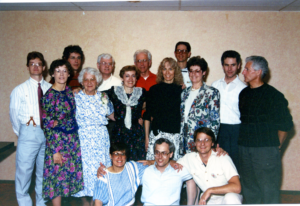
1993
On April Fools’ day, Gertrud had knee replacement surgery, and Ed spent over a week with her after the surgery. On July 2, Gertrud had a heart attack in front of many of her relatives in Amherst Junction, Wisconsin in the front seat of Liz’s brand new Subaru station wagon (a/k/a the Car from Hell). Gertrud’s nephew Peter Hofmann from Switzerland had arrived in America in time to watch his aunt’s heart attack. In late July, Gertrud had a cardiac cath and angioplasty. Gertrud was readmitted to the hospital in late November with some further suspected cardiac problems.
Gertrud’s son Edward who lived less than an hour away in the Milwaukee metropolitan area, became increasingly involved with her financial matters. Gertrud gave him a power-of-attorney for financial matters and made him a joint owner of her checking account. At first, Edward would limit his involvement in her bill-paying to simply preparing the checks for Gertrud to sign. Eventually, she said just write and sign the checks.
Because Gertrud’s only income was social security, a successful effort was made to get her on Title 19. To supplement her social security, most children kicked in $50 on a periodic basis for expenses.
1995
In 1995, Gertrud moved to a one-bedroom assisted living apartment – Unit Number 209 in Mueller Apartments, 1121 Highland Avenue, Watertown, Wisconsin. It had a kitchen but meals were also served in the building’s dining room. Nearly every night, residents played Sheepshead in the common area, an activity Gertrud could participate in despite her deafness. She still had her car, a Chevy Corsica, but she limited her driving to Watertown and vicinity.
1996
On May 4, 1996, Gertrud’s children had an 85th birthday party for her at the East Gate Inn on the Rock River in Watertown, Wisconsin. There was a reception at noon with a dinner at 1:30. There were a lot of out-of town guests, making it a lovely event. All the grandchildren and great-grandchildren attended as did Gertrud’s three American siblings.
Shortly thereafter, she voluntarily gave up her car. This was a relief to family members because the deterioration of her driving skills had been noticed by her children.
By this point, Gertrud was no longer taking any big trips. Mostly, she traveled to family gatherings such as Thanksgiving and the annual Fourth of July Party at Elizabeth Langer’s lake home.
1998
By the spring of 1998, Gertrud’s health had deteriorated to the point that she needed more care than was provided in her assisted living apartment. Consequently, she moved to a Community Based Rehabilitation Service (CBRS) facility, Zinzendorf Hall, 1148 Bayberry Drive, Watertown, WI. Her new home was be a large room with a private bath. All meals were served communally and the medical staff handled all of the medications for the residents. Since Gertrud was no longer permitted to have a cat, her son Edward took Rosebud in.
1999
On Saturday, May 1, 1999, Gertrud celebrated her 88th birthday. A number of relatives visited her that day. The next day she was admitted to Watertown Memorial Hospital. She stayed in the hospital for a few days when she was transferred to skilled care at Marquardt Manor in Watertown, Wisconsin. After she moved there, her food consumption and daily exercise dropped markedly. She started talking about death. On the morning of Sunday, May 16, 1999, she slipped into a coma. All of her children were notified of her condition. This put her children in a quandary since Sister Mary Grace Langer, her sister-in-law was celebrating her 65th anniversary of being a nun. Despite their mother’s condition, a number of her children went to Sister Grace’s celebration. A number of her children were with her the rest of the day. Around 11 pm, Elizabeth said Gertrud was near death. Although she expired shortly before midnight, she was pronounced dead at 1:30 a.m. on May 17, 1999. The immediate causes of death were congestive heart failure and coronary heart disease. Other significant conditions were diabetes, atrial fibrillation and asthma.
The funeral was held at St. Bernard’s in Watertown, Wisconsin with Father Thomas Marr officiating. Most of Gertrud’s children joined in the music for the service. Carol on piano and Patrick on violin provided pre-funeral music. During the service, Vern sang Jesu Joy of Man’s Desiring accompanied by Carol on piano and Patrick on violin. A Langer choir consisting of Jean, Vern, Carol, Mary, Liz, Rosie, David, Pat, Ed and Terry sang Panis Angelicus. Most of the grandchildren had non-singing roles. The pallbearers were Robert Michaels, Barbara Bovee, Jill Jewell, Steve Langer, Jodi Langer, Randy Langer, Leilani Durand and Nicholas Zimmer. The pall was placed by Anne Langer and Susan Woods. The readers were Jeff Langer, Greg Langer, Marcia Langer, Jeana NcNeil. The gifts were presented by Tami Langer, Sadie Mae Zimmer and Palidon Langer. The remarks of remembrance were by the eldest grandchild Tony Michaels. The second eldest grandchild, Ron Michaels, led the congregation in reciting the Our Father (Vater Unser) in German. (At his wedding, Ron had the Our Father (Vater Unser) prayed in German to honor his grandmother Gertrude.)
Gertrud Hofmann Langer was buried beside her husband at Holy Assumption in Clyman. Close by are the graves of her mother Marie and step-father Leo Loetscher. As was the European custom, the mourners shoveled dirt on the coffin.
A death announcement in German was prepared and mailed to her Swiss relatives.
